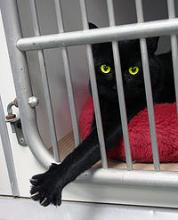10. When you adopt a cat from a shelter, you are usually getting it from a much more humane place than if you do from a pet store. Pet stores often receive their animals from shady sources, where animals may be abused or over-bred. While people may reason that these animals may need to be adopted more than any others, continuing to purchase animals from these sources just continues the cycle of abuse and allows them to continue staying in business.
9. Shelter animals are usually spayed or neutered. Spaying or neutering pets is essential in preventing homeless cats and dogs. If you get your animal elsewhere, you often have to add veterinary costs into the mix when you have to get him or her spayed or neutered yourself.
8. Shelter cats are typically immunized. Many states require cats to be immunized when kept as pets. It’s also simply important to keep your cats’ immunizations up to date for his or her overall health.
7. Shelter kittens are de-wormed. Worms are usually a problem with kittens—which can make pet owners especially worrisome. Kittens should not be given over the counter worm medication, as it could potentially harm them; it’s better for them to receive medication from a veterinarian. That’s one more cost you can circumvent when you get a cat from a shelter.
6. Buying from a shelter supports homeless animals. While you’re preventing animals from being traded and sold in cruel situations (see #10), you’re also supporting the care, health, and prevention of homeless cats and dogs.
5. Shelter animals are assessed. While you might just be able to buy any pet in a pet store, shelter workers assess pets to determine whether or not they will live well with other animals, children, or in special circumstances—such as in an apartment or outside. (It is recommended that all cats be kept inside most of the time, since outdoors they can be exposed to a variety of diseases and injuries.)
4. Shelter personnel are usually quite helpful. While a pet store operator may simply be after a sale, shelter operators are primarily interested in the well-being of the animals. They will make sure a family is well-suited for an animal before allowing them to adopt him or her.
3. Shelter animals are often more socialized than pet shop animals. With volunteers and staff regularly playing with them, shelter pets may be ready to come home with someone more than an isolated animal might be.
2. Shelter animals are often house-trained already. Cats are generally pretty quick to learn how to use the litter box, but with the support of shelter staff, shelter cats usually know how to use the litter box before coming home.
1. You can save a life. Since they are often so over-filled, shelter animals are often euthanized after remaining at a shelter for a long period of time.
